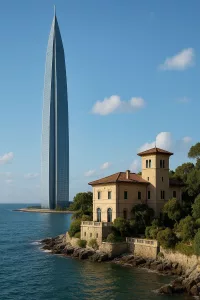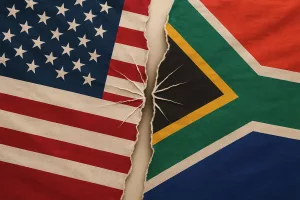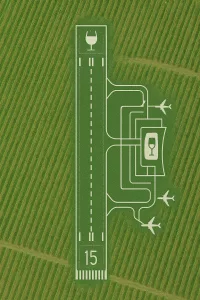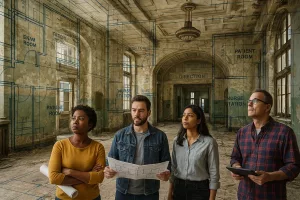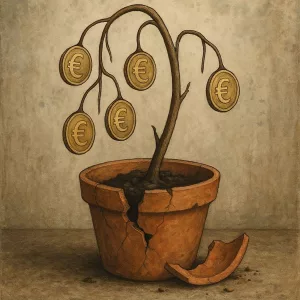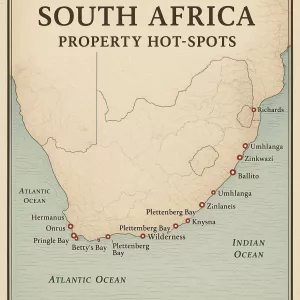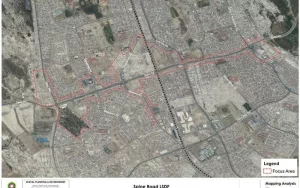Even though it’s December and many are on holiday, South Africa’s Parliament is still hard at work in Cape Town. A small group of people virtually decides how billions of rand will be shared between provinces and cities. This is called DORA, and it’s super important because it’s the last chance to move money around for things like hospitals and schools. They argue a lot over who gets what, because every rand counts, and they have to finish before a deadline.
Cape Town’s fancy houses are selling like hotcakes! Rich people can work from anywhere now, so they’re moving to beautiful Cape Town. Foreigners love the good exchange rate, making homes a steal for them. There’s also not much empty land left, and the city has better water and power. This makes Cape Town a super popular place for luxury living, with prices going way up!
Somerset Mall was like a smart detective, figuring out where local shoppers were spending their money outside the town. They found out a huge R1.8billion was leaving! So, the mall got clever. They brought in all the popular stores people wanted, made it super easy and fun to walk around, and even added special touches like gear for local adventures and cool tech for kids. They also cared for the planet and helped their community, making the mall a vibrant heart of the town.
The US and South Africa are in a big fight over trade! South Africa might lose its special trade perks, which means its cars and farm goods could get hit with huge taxes. This all started because the US didn’t like South Africa’s friendship with Russia. Thousands of jobs are on the line, and the future of South Africa’s economy hangs in the balance.
Paul Siguqa, a fund manager, bought Klein Goederust winery in 2019, becoming the first Black owner in Franschhoek. His mother, a grapepicker, inspired him to buy land. The farm, once neglected, now thrives with unique wines and architecture, telling a new story of heritage and success.
Botswana suddenly stopped South African vegetable imports, causing chaos for farmers and markets. This big move was to help local farmers and create jobs before elections. South Africa is now thinking about striking back, maybe by hurting Botswana’s valuable fruit exports. This whole mess shows big cracks in their old trade agreement, leaving many wondering what will happen next for both countries.
From Dirt Runway to Smart-Airport City: Inside Cape Winelands Airport’s R8-Billion Gamble
Imagine a dusty old airstrip, once just for small planes and skydivers, now becoming a supersmart airport city! This R8billion project, Cape Winelands Airport, is building a huge runway for big cargo and passenger planes. It will have fancy wine cellars right in the terminal and special cold rooms for fresh goods. This amazing transformation will help clear traffic, boost business, and get delicious exports to the world faster.
SterKinekor is changing movie theaters to be super cool and fun! They have fancy coffee, comfy chairs, and special rooms for kids with slides and ball pits. You can even play games or smash things in their new zones. They use smart tech to change ticket prices and make everything just right for you. It’s not just watching a movie anymore; it’s a whole new adventure!
Cape Town’s Cavendish Square is getting a super fancy new cinema! Nu Metro spent tons of money to make it amazing. They have comfy leather recliners, giant screens that wrap around you, and super clear projectors. You can even order gourmet food and drinks from a chic lounge. It’s all about making moviewatching feel like a special, luxurious escape!
Africa has no Michelinstarred restaurants because Michelin demands huge fees from tourist boards for inspector visits. African countries, like South Africa, refuse to pay, choosing instead to fund local events and safaris. They believe their food is already amazing and celebrated by locals and tourists alike. This means African chefs are creating their own unique food scene, gaining fame through social media and local awards, proving delicious food doesn’t need Michelin’s stamp of approval.
Cape Town’s old Woodstock Hospital is getting a new life! It will become a special place with 500 new homes, including many for people who don’t earn much. The coolest part is that the 837 people already living there will get to stay and move into these new homes. It’s a big plan with clever money tricks and community power to make sure everyone has a fair chance at a home.
The ANC, once a powerful liberation giant, is now struggling to pay its employees. Its bank account is empty, leaving staff without salaries for months. This is happening because fewer people are paying membership fees, and the party has a lot of debt and unexpected legal bills. Even though employees are hurting, the ANC is finding it hard to get money, making payday a scary ghost story for many.
South Africa’s coast is booming! People are rushing to buy homes there, not just for holidays, but to live and work. Remote work means you can have an office with a sea view. This makes coastal homes super valuable, acting as offices, retirement plans, and moneymaking rentals. Get ready, because the demand for these amazing seaside spots isn’t slowing down!
South Africa’s Quiet Rail Revolution: 46 Second-Hand Locos Rewriting the Rules of African Freight
South Africa is getting its railway system back on track with a smart move! A private company, Traxtion, bought 46 old diesel trains from New Zealand. These trains are special because they fit South Africa’s old tracks perfectly and can easily cross borders. This helps deliver goods faster and cheaper, boosting trade and making everyone happy, from farmers to big companies.
Township Labs helps South African teenagers become ecoentrepreneurs. They turn everyday problems into green businesses, like using fly grubs to make fertilizer or old tech to create solar lanterns. These young innovators get training, money, and mentorship, transforming their communities and boosting the country’s green economy. It’s all about simple ideas making a big, positive impact.
Spine Road Reborn: Cape Town’s 12-Km Corridor Becomes a Living Laboratory for Dense, Green and Inclusive Growth
Cape Town’s Spine Road is getting a fantastic makeover! This 12km stretch, once just a busy road, is transforming into a vibrant, green, and fair community. It will soon be home to 35,000 more people and create 12,000 new jobs. Imagine new homes, shops, and green spaces, all planned carefully to make life better for everyone. This project is a grand experiment for how cities can grow in a smart and caring way, showing the world how to build for nature and people.


